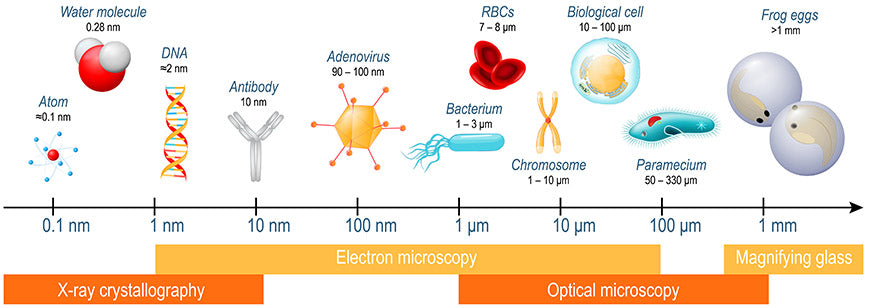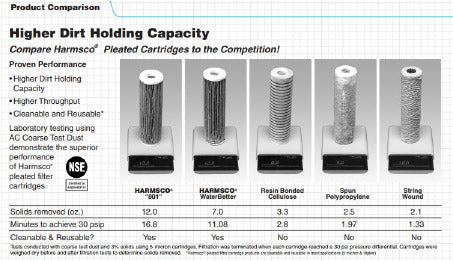What Kind of Filter Do I Need?

What Kind of Filter Do I Need?
7 April, 2023
Tags: Filter, Water, Water Filter
2 min read
Summary
In the United States, it is rare to find any water supply that cannot benefit from the use of a water filter. More than 80% of the U.S. gets their water from a municipal source, however a majority of this water comes from ground water supplies, subject to a variety of ever-changing contaminants.
Clean & Safe Water
Even with EPA oversight, it is impossible for municipalities to ensure clean and safe drinking water 100% of the time. Multiple physical and environmental factors make sustained water quality a moving target. Factors such as:
- Urbanization
- Sewage Overflow
- Bacteria and E. Coli
- Pesticides
- Aging Infrastructure

Reactive data collection also contributes to the list of contamination sources that we must remain mindful of. You often don't learn about water contamination until it is too late.
Water filtration is useful to address many water quality concerns, however, filtration is only one process of many treatment types. Water filtration can accomplish many things, but a filter is not the answer to every type of water problem. At the beginning of this discussion, it is important that we understand what a filter can and cannot do. To do that, we first need to determine what type of filters there are and how they might be used.
I. Types of Filters
Filter types can be broken down into several categories. The location a filter is installed can also determine what kind of filter is needed. In the filter hierarchy, there are several categories of filters, but essentially, we can break them down into four (4) distinct categories:
- Point-of-Entry Filters
- Point-of-Use Filters
- Tank-Type Filters
- Cartridge-Type Filters
Point-of-Entry Filters refers to filtration devices meant to filter the water as it enters the entire home or business. They can be either Tank Type or Cartridge-Type filters. The tank-type filters can run as small as a 10 diameter x 17 high tank, all the way up to a 36 x 72 (and bigger) for commercial point-of-entry applications.
The tank-type filter and be either backwashing or of the non-backwashing variety. Many people use a 4.5 x 10 or a 4.5 x 20 cartridge filter or even a Stainless Steel Tank with Clusters of Cartridge Filters inside for commercial applications.
Point-of-Use Filters refers to filtration devices used to filter water at a single location such as a faucet or ice maker. They are usually Cartridge-Type filters. Most commonly filters 2.5 inches in diameter.
Within the above categories there are several different types of filters. Let's first focus on Point-of-Entry filters.
Sediment Filters
Often referred to as mechanical filtration, sediment filters are used to remove suspended solids like sand, sediment, silt, and dirt. It is important to know the difference between suspended solids and dissolved solids. Suspended solids are particles in water that are insoluble, such as a grain of sand. If you add sand to water, it cannot dissolve into the solution.
A dissolved solid is a compound or element that CAN dissolve in water such as sodium or calcium. To remove dissolved solids, a chemical or physical change must be applied.
It is common for people to believe that a sediment filter is the solution for any given water problem, ranging from iron, to water hardness, to chemicals. The truth is a sediment filter is usually just the first step in a complete and comprehensive water treatment system.
Sediment filtration is often measured in micron (?m) reduction. Micron is a unit of measurement of length. 1 micron is equal to 1 millionth of a meter. Below is a graphic visual of micron sizes.

These filters can be tank-type filters (which should have backwashing capabilities so that the sediment they trap can be removed) or cartridge type filters. Typically, it is most desirable to filter the water to 5 microns or below. Within the sediment cartridge filter family there are several types of sediment filters, namely String-Wound Filters, Spun Polypropylene, Resin Bonded Cellulose, and Pleated Polyester filters.

Which type is best? A number of years ago, a provider of commercial filtration solutions, Harmsco Filtration Products commissioned a test whereby all four types of filters were tested against each other.
The test was conducted with coarse test dust and 3% suspended solids using 5-micron cartridges. Filtration was terminated when each cartridge reached a 30-psi pressure differential. Cartridges were weighed dry before and after filtration tests to determine solids removed. The pleated filter cartridge provided dramatically higher solids removal than any other type of filter. Here were the results of the testing:
Yet many people say that they really like string-wound filters probably because they are cheap, however they end up trapping the least amount of sediment. The filters may last longer, but they don't take much sediment out compared to pleated polyester filters that we prefer to utilize.
Other Filtration Types
Carbon Filters are designed to remove chemicals, chlorine, pesticides, and volatile organic compounds through adsorption and absorption. Also, some carbon filters are able to remove lead and PFOA/PFAS (forever chemicals). Carbon filters come as non-backwashing tanks, backwashing tank-type filters and cartridge filters, although cartridge-type carbon filters are best-suited for Point-of-Use applications due to their lower capacities and flow rates, relative to tank-type filters.
Iron and Sulfur Filters are generally tank-type backwashing filters, but since iron and/or sulfur cannot be filtered by simple filtration, they usually operate with some kind of oxidizer ahead of the filter. The most common oxidizers are chlorine, oxygen, ozone, and hydrogen peroxide. These oxidizers are introduced into the backwashing tank or just ahead of the backwashing tank(s). The oxidation process is the chemical change required to filter the dissolved solids.
Water Softeners while not technically filters because they use a process called cation exchange water softeners can technically be deemed filters because they as similar to tank-type backwashing filters. Most people deem a water softener to be a type of filter and for our purposes, we do too. Of course, a water softener uses salt to soften the water. By trading hard-water minerals for sodium, we are effectively filtering out nuisance minerals.
Tannin Filters come in tanks that look like a water softener but they use the chloride in the salt to remove tannin from the water. In case, you are not sure what tannin is, know that tea gets it's dark color from tannin. There are also cartridge filters that can remove tannin. They use a special material that has a zeta charge so as to remove the tannin present in the water.
Specialty Filters are either cartridges or tank-type filters that are made for a specific purpose generally involving the use of a specialized media for the removal of things like arsenic, PFOA/PFAS, nitrate, minerals (called deionization), fluoride and other contaminants. We also have reverse osmosis, nanofiltration, ultrafiltration, hyperfiltration, microfiltration, and even ultraviolet disinfection, which is not technically filter, but operates substantially as one to kill or inactivate bacteria. (See The Filtration Spectrum Chart below).
This is just an overview of filters and their applications - US Water Systems could write a book on the subject. We did write the book, our expertise is just a phone call, chat or e-mail away. You can always rely on the experts at US Water System to assist you with any water problem - city or well water, big problems or easy problems. Great Water Starts Here!






Leave a comment
Please note, comments need to be approved before they are published.